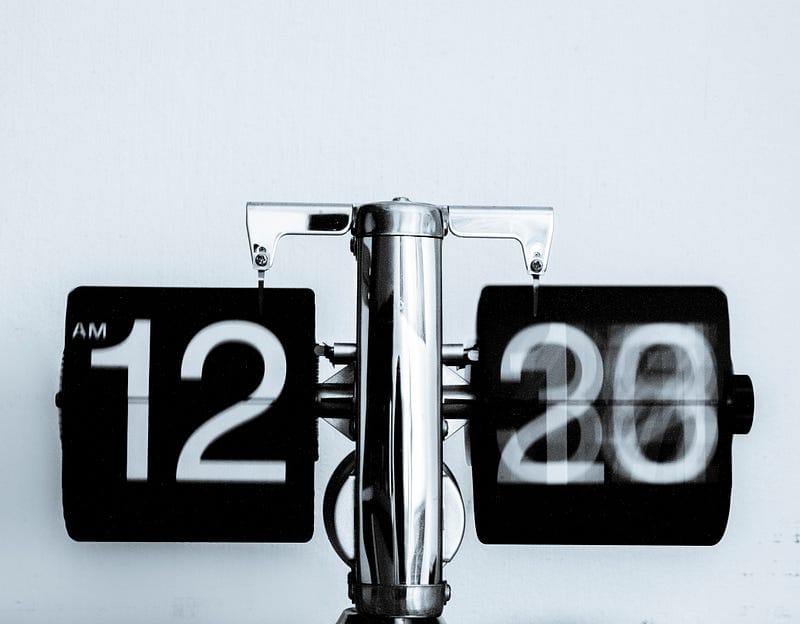700,000 Hours: The Only Thing Life Has Given Us. Use Them Wisely.
How long is your life in hours? And what are you going to do with them?

How long is your life in hours?
Let’s run some numbers. One year of your life has 365 * 24 hours, so 8,760 hours.
The average life expectancy for a German male is roughly 80 years. Hence, 80 * 8,760 hours equals the duration of my life: 700,800 hours.
Now, I’ve already lived for a few years, 26 to be exact. So I have 54 years left, or roughly 475,000 hours. That’s actually quite frightening. I feel very young, but the reality of having lived for 225,000 hours already strikes me a bit.
But that’s not all. Let’s assume I sleep for 8 hours a day (or should, at least — wishful thinking) and spend 2 hours a day on maintenance (showering, brushing teeth, eating, drinking, …), then there’s only 275,000 hours of time awake and freely available left.
Is that a lot? I have no idea. I simply cannot relate to such a large number in the context of hours. There’s only one thing I know: once the current hour is gone, it’ll never come back. Ever.
Time is our most valuable resource, nevertheless we disrespect it in an almost frivolous manner. How often does the day just pass by without really having lived mindfully, going to bed without a sense of fulfillment? To me, that still happens a lot. Tic Tac. Another day gone. And while we tend to think we have plenty more of them, they’ll pass by sooner than we can even fathom.
Wasting Time

This post was inspired by the idleness I observed when I traveled to the Dominican Republic in 2017. Monday, around 11 am. I’m walking down to the beach and there are people sitting everywhere. Hey — it’s awesome that you can do that, but … is this really where you want to be? I’ve talked to plenty of these people just hanging around and if they were happy where they currently are. 100% of them said no (n = 12).
That made me think — you’re telling me you’re not happy in your current situation, yet you’re just sitting around doing nothing? Something’s wrong here. And I’d like to find out what it is.
We all know the old adage: “time is money”, or in more mathematical terms, “time equals money”. Therefore, wasting time equals flushing money down the toilet. And a lot of it.
Here’s how I waste my time every day: 37 minutes on Instagram, 12 minutes on Facebook, 17 minutes watching videos on Youtube. And that despite the fact that I’ve already ruthlessly optimized my usage of time (more on that below).
In my opinion, that is borderline criminal. The same is true for the people in the Dominican Republic: in the previous logic, they’re constantly throwing money into the Atlantic Ocean. And that just cannot happen.
Side note: There are huge benefits to idleness (as in, doing nothing), and I strongly believe it is necessary to have some idle time every day. But social media is not idle time, nor is being stuck in traffic, waiting for the bus, having an excessively long commute or constantly switching contexts at work.
“But Dominik, I have a job, I do sports, I live a great life, I’m not one of them.” Right. And you never “have time” (aside: this phrase is my personal arch enemy). That’s okay if you’re happy with what you’re doing, because you’ve got your priorities straight.
Most of us however haven’t.
“I’d like to read more”, “I’d like to speak another language”, “I really want to spend more time with my girlfriend”, “I do want to go to the gym.” Cool — so why don’t you do it?
“But .. when?”
Glad you asked.
I’d like to present a few activities that you can leverage and techniques that will help you free up more time for the things that really matter to you. I’m also most focusing on the things happening outside of your professional life (although some of the below points can also be applied to life inside the office). Let’s get into them.
5 ways to get more out of your time

1. Leverage your commute
As normal human beings in our society, chances are that we’re not working from home but instead have to go to our job or our university. For instance, it takes me around 15 minutes to get from my home to the office. Now, there are several ways that I could get there. I could either take a bus or use my bicycle.
The former is convenient, but the latter is a lot faster, cheaper and allows me to work on my cardio every day. Ew, Cardio — something that I normally only do when absolutely necessary (cardio is the devil!) and probably would not make time for outside of it. While commuting (I have a route without a lot of traffic), I listen to audiobooks or podcasts. 15 minutes isn’t a lot of time though — or is it? Here are some number acrobatics: 15 minutes * 2 (because I also have to go back home) * 5 (5 workdays a week) * 4 (4 weeks in a month) = 10 hours of time spent commuting every month.
To put this into relation: this is the time it roughly takes to listen to one average-to-long audiobook on normal listening speed. In other words: I get to read one books every month and have solid cardio simply due to leveraging my commute.
This adds up to an additional 12 books a year — on top of the time that I dedicate to reading anyway. That’s a ton of books, more than I’ve probably read during my studies. Just imagine what you could do with all that information. It’d be insane.
If you want to start doing that, podcasts on Spotify and an Audible subscription are good places to start. The apps are incredibly easy to use and in no time, you’ll have learned a lot.
Because I really want to hammer this point home, do the same equation again but this time, you have a 60 minute one-way commute. This adds up to 40 hours every month — or, roughly, 11.3 % of your awake time (assuming you sleep 8 hours every day). Shit. That’s A LOT of time — and it’ll be gone forever. You better use it.
Personally, I always tend to pay a premium for location. A long commute to work simply isn’t worth paying $200 less in rent every month, as I just demonstrated. So if you’re stuck in a situation like that, you might want to think long and hard about moving closer to your workplace.

2. Leverage other activities
In order to not let this go unmentioned, you can apply this principle to any activity that does not require your full attention. I like to call my parents and grandparents while I’m cleaning or washing dishes, for instance. Household activities are things that I absolutely despise, but by calling the family, they become a lot more enjoyable. Grandma is happy and so is the flatmate.
Same goes for the gym: you have plenty of time between sets (if you train like me at least), so listening to a podcast while working out works pretty well.

3. Outsource things that you dislike doing or aren’t very good at
Speaking of household activities … you absolutely must have a cleaning lady.
Back to “time equals money”. I value my time at around 100 € per hour (if you want to get into the nitty-gritty economics with perfect substitution and all that, feel free to message me). Therefore, if it takes me two hours to clean the apartment and I can get the job done for less than 200 €, I shouldn’t do it myself. I can get a cleaning lady for this purpose for around 40 € in Germany (not to mention that the quality of her cleaning will be so much better than when I clean — trust me. Or ask my flatmate. Or my mom.).
Why should I do it myself? I don’t enjoy it, and it’s not worth my time. Therefore, the only rational solution is to outsource it.
If you’re one of those insane people who actually enjoy cleaning, by all means, go clean yourself. If you truly enjoy an activity — just like I enjoy grocery shopping and cooking, for example — by all means do it!

4. Eliminate time consumers
Back in 2017 in the Dominican Republic, my phone was stolen. Gone was all my access to Instagram, to Facebook, to Snapchat, to WhatsApp — and I really wasn’t missing anything.
Now, the easiest way out would be to simply not have an account there; which is easy to say, but hard or impossible to actually put into practice (unless you’re my buddy Jonas, who actually managed to do it). Facebook has been a blessing in managing my whole network, and I wouldn’t wanna miss it for the world. And I do love downloading Instagram every once in a while to look at all those photos. It’s fun, but it needs to be done carefully.
You can, however, eliminate the most time-consuming part of it: the newsfeed. There is an amazing browser extension called “Facebook Newsfeed Eradicator”, which simply blocks your newsfeed and instead gives you a smart quote from somebody.
I regularly catch myself going to facebook.com, just to realize that there’s nothing going on there. I highly recommend installing it. On the phone, just use the messenger app; not the Facebook app. The same is true for Instagram and others: switch off the notifications and all the sudden, you won’t even know what to do with all your time anymore.

5. Stop binge watching Netflix
“But I love Game of Thrones!” Absolutely — and that’s awesome! The beauty and ugliness of TV series is that it’s just so easy to watch another one; it’s so smooth and shallowly rewarding. And all the sudden, you’ve spent 6 hours in front of the TV without actually having achieved anything.
I personally don’t watch TV series (when I tell people about that, sometimes they tend to look at me like I just told them that I’m Amish and have never used a car before — which is funny because I don’t drive often, either), because I prefer to do other activities that I find more rewarding. This is completely up to you — but I want you to be aware of how big of a time sink Netflix and TV is.
Do you have to be productive all the time? God, no.
After a long workday, I sometimes cherish the ride home without having any input, or sitting on the roof doing nothing for 30 minutes. It’s part of human life and we should not forget to take our downtime every now and then.
What’s important to me is to consciously take that downtime — and not just “letting it happen to you”. As I’ve stated previously, control over our lives is one key factor of happiness — and that also includes controlling your idle and non-idle time.

Closing
During the past couple of years, I’ve gotten the feedback every now and then that I’m very mature and reflected for my age. That makes me feel warm and fuzzy, and it’d be easy for me to say that I’m just super awesome and mature and everything.
However, I don’t think that that’s my personality — it simply is the result of good habits, and especially of reading a lot. Reading is one of the things that I the most on a regular basis, and it has greatly expanded my view on the world as well as on myself. Just think about it: an author (presumably) only writes about things that he has understood at a transcendent level; therefore, he probably put in 10,000+ hours of his time into that topic. Going back to the calculations above, if the author decided to start working on that book at precisely at age 26, he poured a solid 5% or even more of the rest of his life into that book. You better respect that.
When you read his or her book, you can acquire that knowledge (to a certain degree, of course), within 5–10 hours. That’s very accelerated learning and one reason why the invention of printing has advanced our society so far. Use reading as a mean to leverage your time in order to acquire great deals of knowledge and perspectives. It won’t hurt you, but instead turn you into a well-rounded human being. Chances are that if you’re reading this blog, you’re already on a good way — keep going!
Am I holier than thou? Absolutely fucking not. Like most humans, I’m notoriously bad at taking my own advice and spend plenty of time pondering about irrelevant decisions, sending stupid snapchats to my friends and doing things that I really shouldn’t be doing. I have plenty of room for improvement.
Yet in the end, it comes down to what we want to achieve with our 700,000 hours. And I certainly don’t want to be the guy whose tombstone says: “he lived an average life, his job was mediocre and his hobbies were watching Netflix and checking Instagram”.
Do you?
This post was originally published in 2017 on my old blog. I’ve rewritten it a bit for style as well as updated my opinions. It can be quite surprising how differently one can think just two years later. You can find the original version here.
Liked this blog post? More than happy to hear from you — let me know in the comments, or shoot me an email at hello@dominiknitsch.com. I read every single one of them.
I also have a newsletter, in which I write short takeaways for every book that I read, and share all my posts. Simply subscribe to my newsletter here.
PS: All subscribers get instant access to all new blog posts, even without a Medium subscription.
Dominik Nitsch Newsletter
Join the newsletter to receive the latest updates in your inbox.


